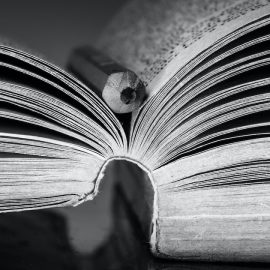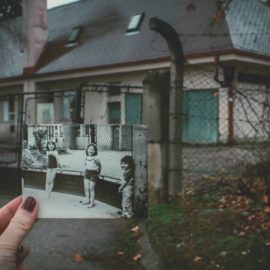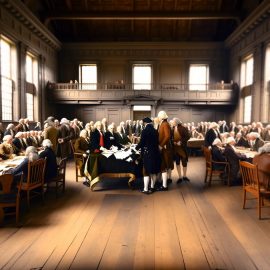

This article is an excerpt from the Shortform book guide to "The Psychology of Money" by Morgan Housel. Shortform has the world's best summaries and analyses of books you should be reading.
Like this article? Sign up for a free trial here .
How did the American consumer mindset come to be? What role did the government have to play?
In his book The Psychology of Money, Morgan Housel included a postscript that discussed how the current mindset around money came to be. He argues that World War II and the Great Depression played a big part in how Americans approach money.
Here’s why Americans have so many conflicted feelings about money, according to Housel’s postscript.
How Americans Think About Money
In the postscript to The Psychology of Money, Morgan Housel posits that in addition to the lessons shared above, you must also understand US economic history to know why the average American thinks about money in the way that they do. He posits that the average American is angry with the current level of economic inequality in the United States because they hold a cultural expectation that we should all make roughly the same amount. He argues that the post-war economic boom led us to this expectation—but that it also led us to develop a cavalier attitude towards debt, which in turn led us to a reality where that expectation no longer rings true.
(Shortform note: The fact that Morgan Housel focuses uses his postscript to explain the mindset of the U.S. consumer explicitly indicates that his advice is most applicable to American consumers in the U.S. market. While this is obvious within the text due to his emphasis on how compound interest works in the U.S. market, his book is advertised as sharing universal principles that apply to how people think about money, not how Americans think about money. As such, non-American readers may find this section especially frustrating, given that it doesn’t provide them insight into how they might think about money, while most of the rest of the book can be extrapolated to non-American consumers.)
Housel explains that in the economic boom post-World War II, Americans developed a mindset that taking on debt to finance large purchases was not a big deal. This happened for two main reasons.
First, he explains, the government actively promoted spending in the post-war decades. After World War II, the United States faced a potential economic crisis: The nation wasn’t prepared to house or hire the 16 million veterans about to return home, and they were desperate to avoid a repeat of the recent Great Depression. To protect their economy, the government passed several measures that promoted spending—like loosening credit regulations—that also led to Americans taking on more debt than ever before.
Second, Housel notes, Americans were finally wealthy enough to buy the products they’d craved during the Great Depression and wartime. Housel argues that during the Great Depression, Americans became incredibly innovative and productive out of necessity—so by the 1950s, they had several new inventions they were good at making. This created several jobs that, coupled with the government strategies promoting spending, prompted an economic boom and increased wages. Americans used this money to buy large purchases, and because the economic boom’s increased wages helped keep the household debt-to-income ratio low, they weren’t afraid of the debts they were taking on.
(Shortform note: There was also a moral component to how Americans spent: During the Great Depression and wartime, indulgence was considered unpatriotic, but by the 1950s, the government’s strategies to promote spending included calling consumers patriotic instead. This attitude contributed to the nation’s sudden acceptance of consumer debt. Moral concerns also influenced what Americans bought: People felt more at ease buying domestic trappings, like toasters or houses, because it reduced the fear that you’d overspend and grow hedonistic.)
This economic boom also instilled within Americans a cultural expectation that you should be able to afford roughly the same lifestyle as your neighbor. Housel argues that this happened because the economic boom increased wages most for the bottom percentages of earners, which narrowed the income inequality gap and created a large middle class where most people did live an economically similar life to their neighbors. Housel argues that you could meet this expectation until about 1980. (Shortform note: This cultural expectation was fueled not just by your neighborhood but by cultural artifacts of the time, like songs and TV shows.)
However, Housel argues that after a brief economic downturn in the 1970s, the resuming economic growth wasn’t as equitable as it had been before. (Shortform note: Housel deliberately refrains from examining why it was inequitable, calling it “one of the nastiest debates in economics.”) The economy boomed as much as it had in the 1950s, but the top 1% profited far more from that boom than the average American—and thus spent far more money than the average American could afford. (Shortform note: The top 1% is a common refrain in economics—but what does that mean, exactly? In the United States, to be in the top 1% in 2017, you had to make at least $478,000, but the average income of the 1% was over $1 million.)
Unfortunately, it turned out that our expectations remained when our economic reality changed. In other words, Americans still believed that you should live like your neighbor, and they still had a cavalier attitude towards debt. So Americans who wanted to live like the 1% copied their purchases. En masse, they bought bigger houses they couldn’t always afford—which helped lead to the 2008 crisis. (Shortform note: Housel doesn’t go into great detail about how this led to the 2008 crisis—perhaps because, as we learned in the introduction, one reason he wrote this book was because of how much financial experts differed in their explanations of why the crisis happened.)
And while many governmental responses to the 2008 crisis were helpful, Housel suggests that they also further widened the already-wide income inequality gap in the United States. (Shortform note: Some researchers also suggest that the 2008 crisis itself worsened the income disparity in the United States.)
But people still expected to lead essentially the same lifestyle as their neighbor—and when they didn’t, they grew angry. Housel posits that this anger fueled political groups like the Tea Party and Occupy Wall Street.
(Shortform note: While people tend to agree that anger over how wealthy a small percentage of the population led to Occupy Wall Street, a different kind of anger appears to have fueled the initial iteration of the Tea Party. A 2010 poll found that most Tea Party members were most angry about policies they thought mostly benefited the poor instead of the middle class and the rich.)
So what now? Housel suggests that we have a popular new expectation: If you’re not born rich, there’s not much you can do about it. And since, as we’ve seen, the expectations formed by our shared economic history drive our actions long after the history that formed them no longer exists, we’ll likely see the economic effects of this expectation for years to come.
(Shortform note: Housel published his book in 2020, just as the COVID-19 pandemic changed the world. The remote work revolution that occurred in the United States as a result of that pandemic may have prompted a different new expectation: I don’t have to deal with bad jobs that are wrong for me. This, one writer argues, prompted the Great Resignation, where the number of Americans quitting their job broke records every month—and may have economic effects for years to come.)

———End of Preview———
Like what you just read? Read the rest of the world's best book summary and analysis of Morgan Housel's "The Psychology of Money" at Shortform .
Here's what you'll find in our full The Psychology of Money summary :
- Why the key to financial success lies in understanding human behavior
- How to make better financial decisions
- How chance plays a bigger role in our financial lives than we think






